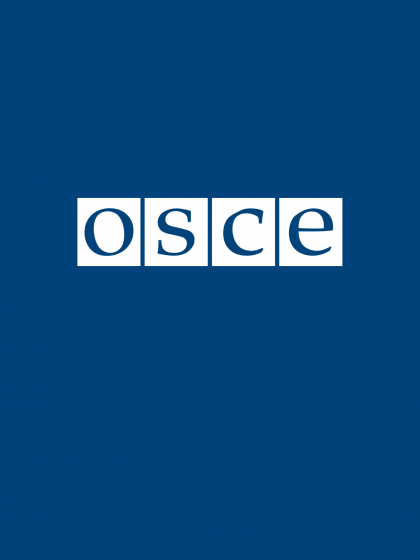Documents library
Gender and Labour Migration: Contemporary Trends in the OSCE Area and Mediterranean Region
Publishing date: 2 November 2015
Content type: Conference / meeting document
Where we are: OSCE Secretariat
What we do: Economic activities, Gender equality, Migration
Publisher: Organization for Security and Co-operation in Europe
Gender-sensitive labour migration workshop, Valletta, Malta, 7-9 October 2015
Gender And Labour Migration: Contemporary Trends in Spain
Publishing date: 2 November 2015
Content type: Conference / meeting document
Where we are: OSCE Secretariat
What we do: Economic activities, Gender equality, Migration
Publisher: Organization for Security and Co-operation in Europe
Gender-sensitive labour migration workshop, Valletta, Malta, 7-9 October 2015
Statement by the Delegation of Norway on the issue of migration in the Mediterranean region
Publishing date: 30 April 2015
Collections: 1049th Plenary Meeting of the Permanent Council
Content type: Statement / speech
Where we are: Permanent Council
What we do: Migration
Publisher: Organization for Security and Co-operation in Europe
1049th Plenary Meeting of the Permanent Council
Statement by the Latvian EU Presidency on the issue of migration in the Mediterranean region
Publishing date: 30 April 2015
Collections: 1049th Plenary Meeting of the Permanent Council
Content type: Statement / speech
Where we are: Permanent Council
What we do: Migration
Publisher: Organization for Security and Co-operation in Europe
1049th Plenary Meeting of the Permanent Council
New-Med Research Network- Migrations Through and From Libya: A Mediterranean Challenge
Publishing date: 24 June 2015
Collections: Publications by the New-Med Track II Network
Content type: Report
Where we are: The New-Med Track II Network, Mediterranean Partners for Co-operation, Networks, Partners for Co-operation
What we do: Conflict prevention and resolution, Migration
Publisher: Organization for Security and Co-operation in Europe
This paper investigates the dynamics of migration through and from Libya, focusing on the economics and politics of illegal trafficking. It discusses EU and member state policies for tackling and reducing Mediterranean migration through Libya and argues that the externalisation of push-backs is neither desirable nor realistic. Finally, the paper offers policy recommendations that propose an overhaul of the current system with the aim of building partnerships with local actors and multilateral institutions while also creating legal corridors for migration into Europe.
New-Med Research Network: European Muslims- Caught between Local Integration Challenges and Global Terrorism Discourses
Publishing date: 24 June 2015
Collections: Publications by the New-Med Track II Network
Content type: Report
Where we are: The New-Med Track II Network, Mediterranean Partners for Co-operation, Networks, Partners for Co-operation
What we do: Conflict prevention and resolution, Migration
Publisher: Organization for Security and Co-operation in Europe
After the positive vibrations that the Arab Spring sent around Europe in 2011, today we are witnessing a reversal of that positive trend. The escalation of violence and insecurity in the region is sending shock waves across Europe and North America. Negative vibrations have been acutely felt in Europe, not only with the Charlie Hebdo events in Paris, but also in relation to the so-called foreign fighters question. Several thousand young people –mostly men but also women–, a tiny, albeit dramatically visible, part of the European Muslim community –some of whom are second-generation migrant youth of Muslim origin, while others are young converts– have joined ISIS forces in Syria to fight a jihadist war. My aim in this paper is to argue that, while the weaknesses and tensions of integration policies exist and may have intensified since the start of the new century, the seeds of minority Muslim youth recruitment in Europe has more to do with today’s global-local connections rather than with failed integration.
Panel 3: Presentation by Sanja Pupacic, Head of Migration and Asylum Department, Croatian Red Cross
Publishing date: 7 July 2015
Content type: Conference / meeting document
Where we are: OSCE Secretariat
What we do: Combating trafficking in human beings, Migration
Publisher: Organization for Security and Co-operation in Europe
Presentation by Sanja Pupacic at the 15th Alliance against Trafficking in Persons Conference, 7 July 2015
Panel 2: Presentation by Michela Macchiavello, Assistance to Vulnerable Migrant Specialist, Department of Migration Management, International Organization for Migration (IOM)
Publishing date: 7 July 2015
Content type: Conference / meeting document
Where we are: OSCE Secretariat
What we do: Combating trafficking in human beings, Migration
Publisher: Organization for Security and Co-operation in Europe
Presentation by Michela Macchiavello at the 15th Alliance against Trafficking in Persons Conference, 7 July 2015
New-Med Research Network- Israel’s Policies toward Asylum-Seekers: 2002-2014
Publishing date: 19 June 2015
Collections: Publications by the New-Med Track II Network
Content type: Report
Where we are: The New-Med Track II Network, Mediterranean Partners for Co-operation, Networks, Partners for Co-operation
What we do: Conflict prevention and resolution, Migration
Publisher: Organization for Security and Co-operation in Europe
This article analyses Israel’s policies toward Sudanese and Eritrean asylum-seekers from 2002 to 2014, a period during which 60,000 entered the country on account of its lax border with Egypt. After introducing Israel’s unique immigration regime the article focuses on Israel’s asylum system, emphasizing the low recognition rates and its chaotic “patch work,” “on the move” character. The second part examines the ways Israel has made it difficult for asylumseekers to live within its borders after entering, focusing on their limited access to social and other public services, and, since 2012, the adoption of a policy of prolonged detention without trial and active encouragement of those detained to leave Israel “willingly” to Uganda and Rwanda. Finally, we use interview data to analyse asylum-seekers’ daily realities and explore their understanding of and struggle against Israel’s immigration and asylum policies.
Panel 1: Presentation by Kadri Soova, Advocacy Officer, Platform for International Cooperation on Undocumented Migrants (PICUM)
Publishing date: 7 July 2015
Content type: Statement / speech
Where we are: OSCE Secretariat
What we do: Combating trafficking in human beings, Migration
Publisher: Organization for Security and Co-operation in Europe
Presentation by Kadri Soova at the 15th Alliance against Trafficking in Persons Conference, 7 July 2015

